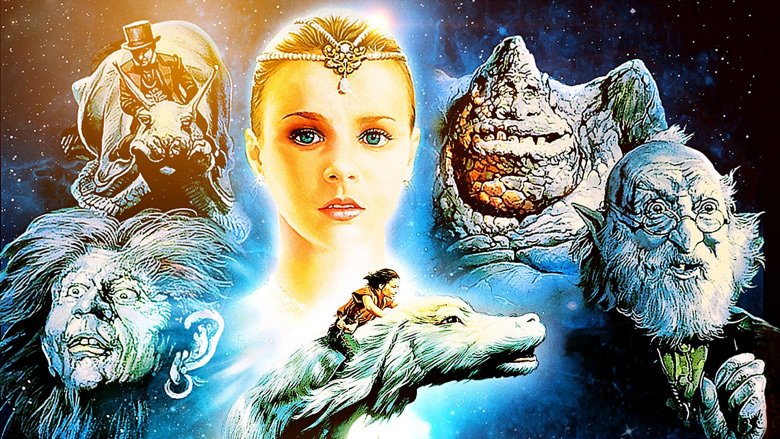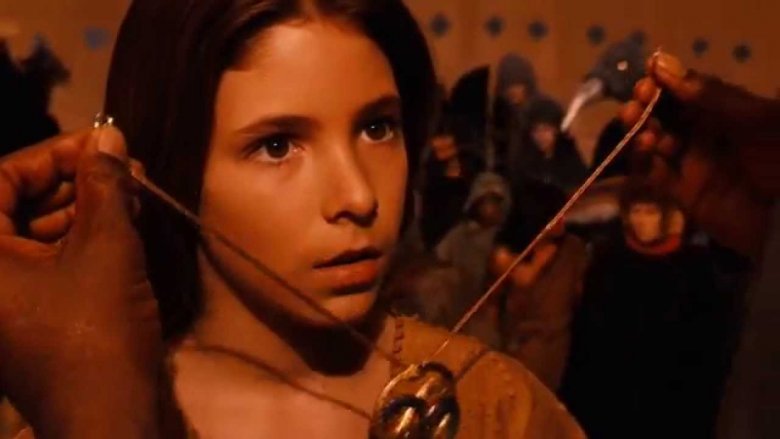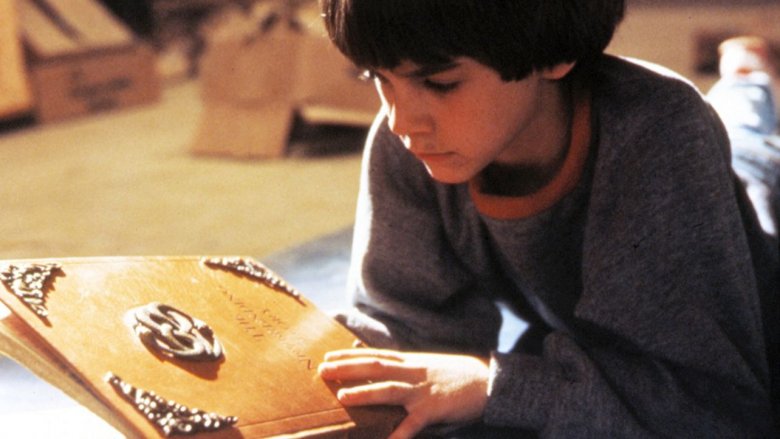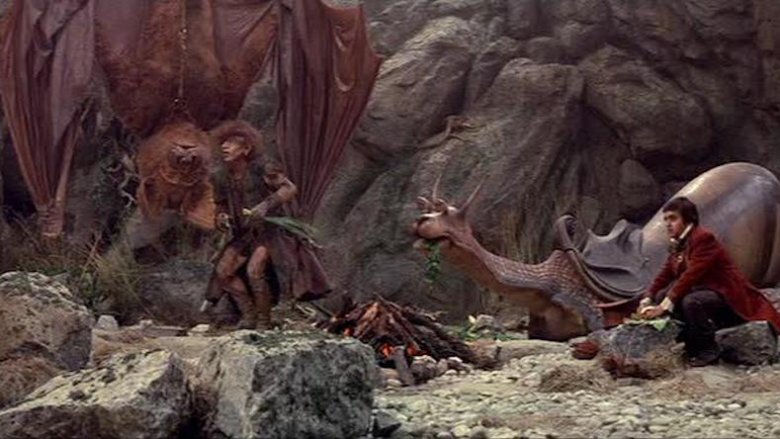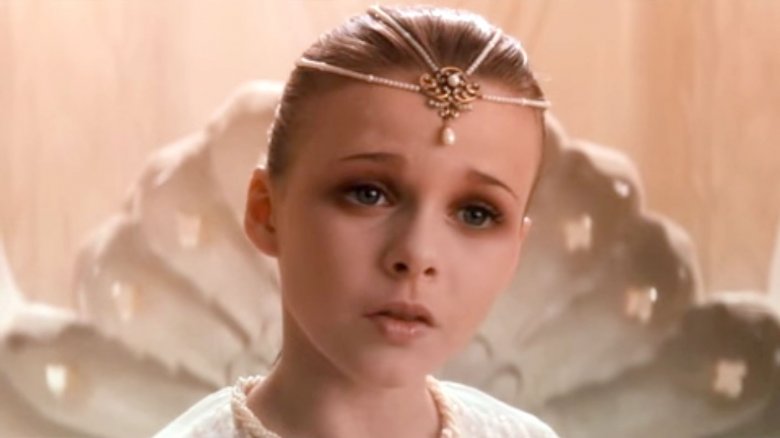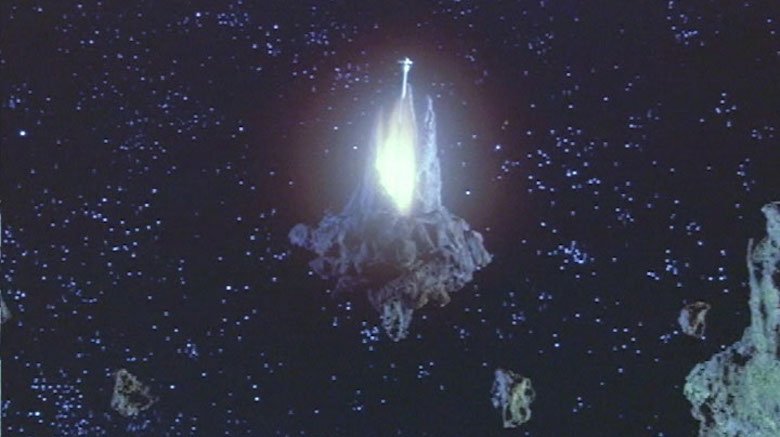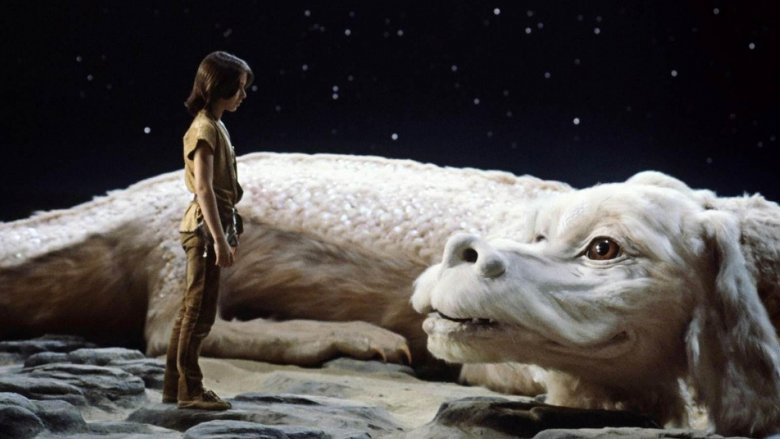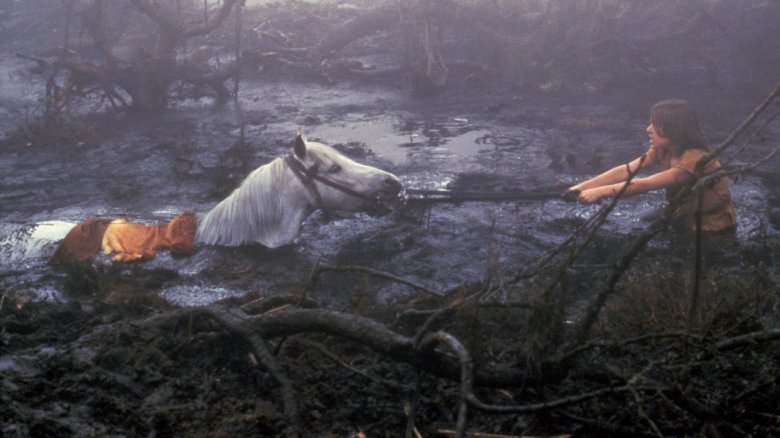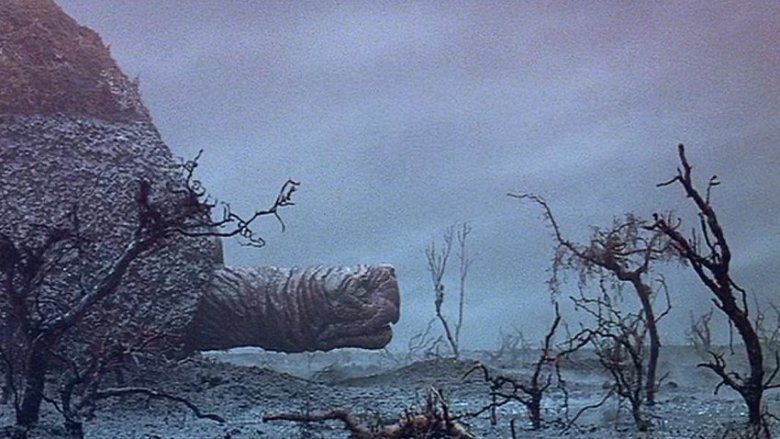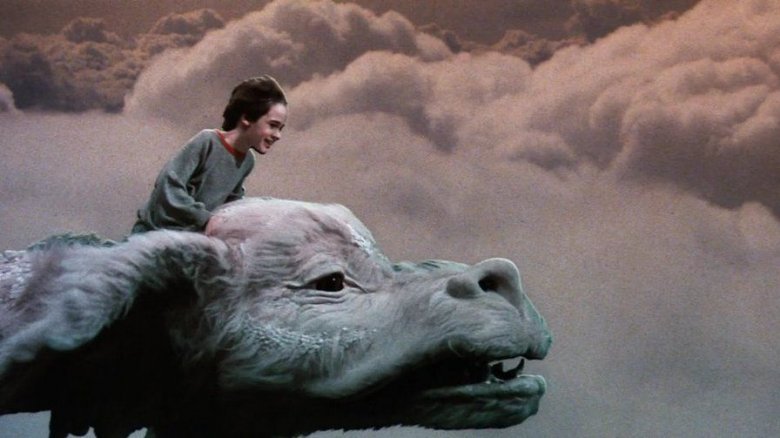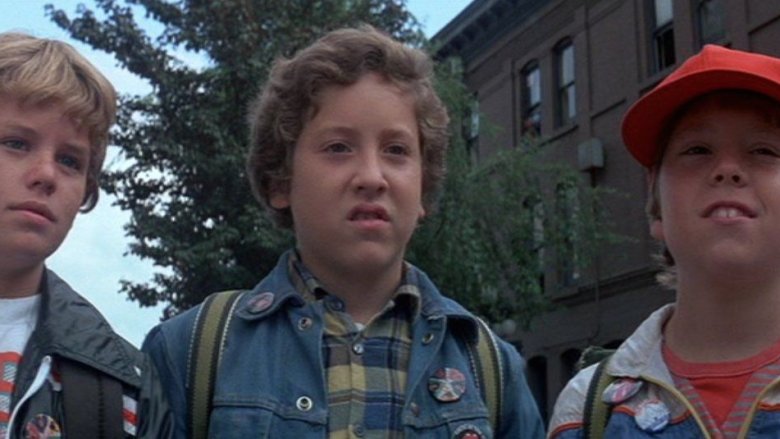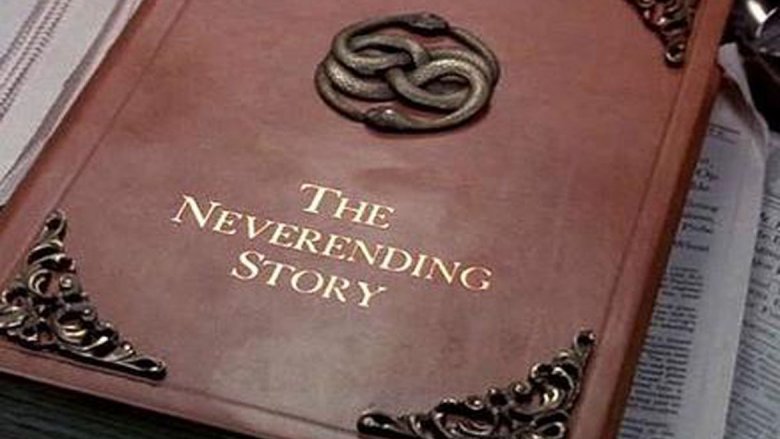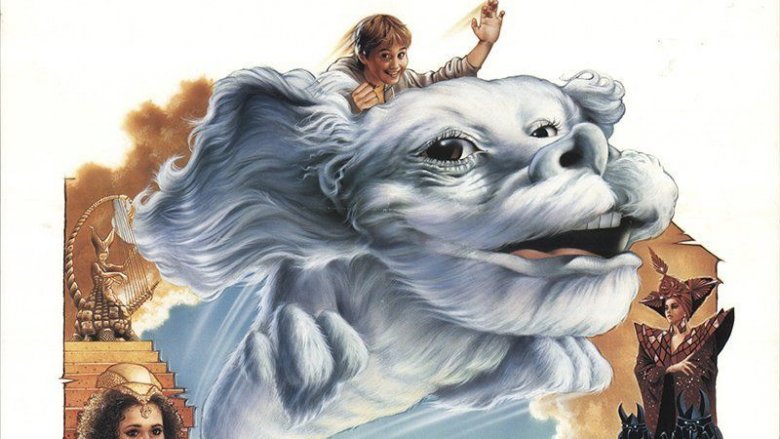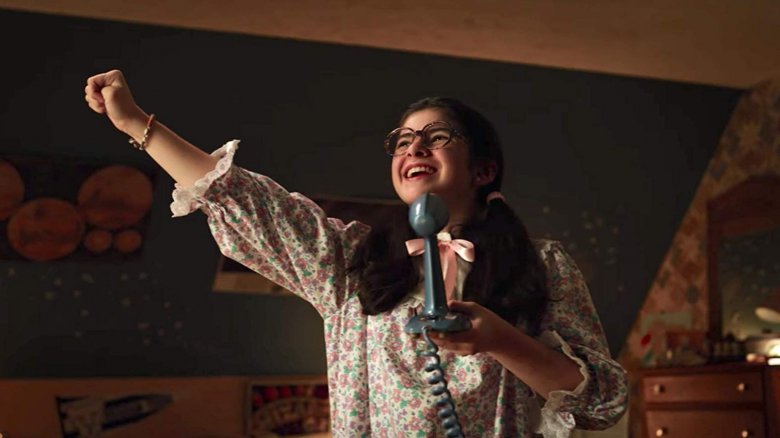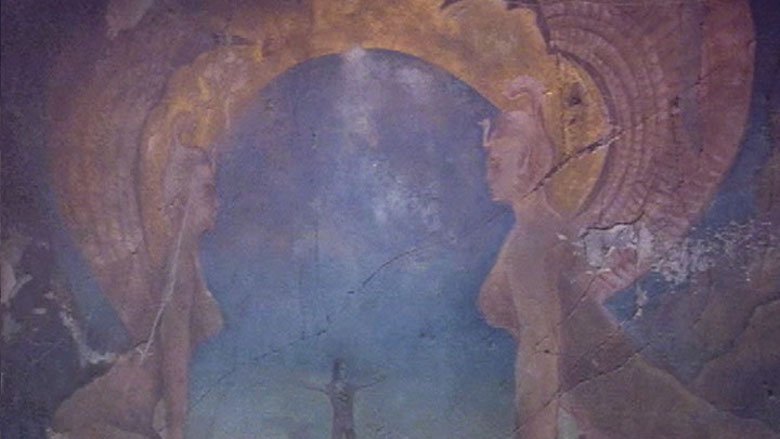The Ending Of The NeverEnding Story Finally Explained
Once upon a time there was a boy named Bastian Balthazar Bux (Barrett Oliver) who was having a rough go of things. His mother had recently passed away, and his father (Gerald McRaney) couldn't relate to his sensitive and still grieving young son. One day, after getting thrown into a dumpster by a trio of bullies, Bastian finds sanctuary in a bookstore. The proprietor Mr. Coreander (Thomas Hill) is reading a special book he says isn't safe for children — so naturally, Bastian steals the book and holes up in the attic at school to read it. As he does, he realizes that he might be closer to the story than he ever imagined.
Adapted from the book by Michael Ende, The NeverEnding Story reached cinemas in 1984 as the most expensive German film production in history, an investment that paid dividends as the film did well in cinemas and continues to be beloved by adults and kids alike. Practical special effects and puppetry have aged the film beautifully, even under the unforgiving glare of high definition. This magical tale about the power of storytelling and faith has so many messages that, like The NeverEnding Story itself, are timeless. Let's hop on Falkor and explore. This is the ending of The NeverEnding Story, finally explained.
Atreyu and the hero's journey, with a twist
The NeverEnding Story twists the tried and true formula of the hero's journey by relying on a young boy to try and save the day. Atreyu (Noah Hathaway) is tasked with finding a cure for the Childlike Empress (Tami Stronach), whose deathly illness threatens the fabric of Fantasia while a dark force called the Nothing eats everything in its path. From the Ivory Tower to the Swamps of Sadness, the Southern Oracle, and the ends of Fantasia itself, Atreyu searches for a cure at great personal loss. He loses his horse and best friend Artax, which threatens the courage and resolve that got him on this journey in the first place, but he makes a new friend in luck dragon Falkor, who helps him get back on track.
At the first gate of the Southern Oracle, Atreyu faces another test: this time he must confront his own self-esteem and self-worth, proving he believes in himself. He then has to confront the vision of his true self in a mousy little boy named Bastian who is reading a book far, far away. Part of Atreyu's journey is complete when he learns the Childlike Empress needs a new name, and only a human child can bestow it. But Atreyu faces more setbacks when he loses Falkor as well as his magical talisman Auryn, and is forced to confront the Nothing's minion Gmork with nothing but his own wits and strength.
Bastian and the armchair hero's story
Bastian has his own part to play in The Neverending Story; at first, it involves simply reading and witnessing the events unfolding for Atreyu and Fantasia. His father is always telling him to get his head out of the clouds, and Bastian can't help but respond by going higher up. He's grieving the loss of a mother who seemed to support her son's sensitivity and daydreaming. Escaping into flights of fancy like doodling unicorns in math class or a special book that's unlike all others is actually a healthy and healing coping method in the short term. When Atreyu loses Artax, Bastian weeps along with him, relating to such a great loss at such a young age. Simply being witness to another's story can also be a heroic act.
Bastian starts out as an armchair hero, watching from a distance, but as The NeverEnding Story unfolds, he realizes that he might be the most important hero of them all. And to honor his cherished mother and her memory, he even gives her name — Moon Child — to the Childlike Empress, saving her and Fantasia. As Bastian makes his wishes, he ensures that all the friendships made before the Nothing's rampage remained intact. He makes sure to restore Fantasia to the glory he could only imagine — and ultimately gets to experience firsthand on a ride with Falkor. Bastian even has the opportunity to give his bullies a taste of their own terrible medicine.
Making friends in unlikely places through shared trauma
As the Nothing sweeps across Fantasia, a ragtag bunch meets in the Howling Forest on their way to the Ivory Tower. The Rock Biter, the Night Hob (Tilo Prückner) and his Stupid Bat, as well as Teeny Weeny (Deep Roy) and his Racing Snail are all members of different Fantasian groups with the same mission: Beseech the Childlike Empress for help restoring their lands. This unlikely group quickly becomes friends as they realize how each can help the others. The Night Hob is able to fly to the top of the Ivory Tower and hear the news. The Rock Biter offers all the little ones protection. And the Racing Snail is here to shatter preconceived notions of what certain kinds of creatures can do.
What bonds them is the shared dispossession of their ancestral lands through the power of dark forces, bringing a colonization theme into The NeverEnding Story's mix. It's a grim moment indeed when the Nothing snatches the Rock Biter's friends right from under him. "They look like big, good, strong hands," he says as he gives up hope and allows the Nothing to take him. Thankfully, because of Bastian's clever wishes, the Rock Biter and his comrades are eventually reunited and continue their shared friendship through the collective trauma they all survived.
The Childlike Empress and her new name
If it seems silly that a new name might save someone's life then you haven't considered the power of what we call things or the power in words themselves. Bastian is called terrible names by the school bullies, and this certainly affects how he feels and sees himself. With the arrival of the Nothing, the Childlike Empress also loses an aspect of herself that must be reinvented, and one way to accomplish this is by adopting a new moniker. This new name would be a new start for not just the Empress, but for her whole world. Not to mention the name Bastian chooses for the Empress — Moon Child — perfectly suits her, as well as being a beautiful tribute to his dead mother.
In real life, parents choose their children's names to have meaning and power in the long term. Sometimes when people get married they change their name to signify this new union. Some immigrants may also change their names in order to assimilate with the majority culture. In the transgender community, choosing a new name is the opportunity for a whole new start at existing in a life-affirming way that fits their gender. Names have power, and a new name is a new beginning.
Saving Fantasia is a win against hopelessness
Arguably one of the most satisfying things about a fairy tale like The NeverEnding Story is how far into destruction we travel before the world is restored to rights. The Nothing destroys all but one grain of Fantasian sand before Bastian heals the Childlike Empress with her new name. Yes, the forces of darkness were defeated, but there is still work to do to properly restore all that's been damaged. When the Childlike Empress grants Bastian all the wishes he needs to recreate Fantasia, it's a victory against hopelessness. Bastian has a huge job ahead of him now that he's no longer just an armchair hero and witness to Fantasia and its stories. When we see Fantasia rebuilt in a new form of glory it reminds us that maintaining hope in even the bleakest of circumstances is a life-affirming act — and one we should strive to cultivate as Bastian does.
Falkor as a symbol of hope and faith
"Never give up hope and good luck will find you," Falkor tells Atreyu after taking him to the Southern Oracle. This sweet luck dragon is easily one of the most beloved characters in The NeverEnding Story. Between his hearty chuckle and his sly wink, Falkor is a reminder that we must always fight against the kind of hopelessness embodied by the Nothing. While many times luck is actually a product of good circumstances, timing, and privilege, the luck symbolized by Falkor is about the faith that goodness — and good people — will ultimately prevail. While Fantasians consider the Ivory Tower their beacon of hope, humans watching The NeverEnding Story are drawn to Falkor and his joyful presence. Even when Atreyu is convinced that he failed to find the human child who could give the Empress a new name, Falkor comforts him and reminds him that he did his very best. Falkor reminds us that sometimes, even if we fail, we still deserve credit for our efforts.
Confronting trauma in the Swamps of Sadness
In a scene that has been traumatizing children and adults alike for decades, Atreyu loses his beloved companion Artax in the Swamps of Sadness. Even today, people who have seen The NeverEnding Story a hundred times will cry or leave the room during this most brutal of scenes. Looking at the big picture, though, the terrible events in the Swamps of Sadness are a perfect metaphor for grief, loss, and trauma, and in particular childhood trauma. This is probably why adults still have a visceral reaction to the incident even years later, because we remember being Atreyu's age and having to navigate our own losses in different ways. What ends up being beautiful about this painful scene is how it shows us that even a warrior isn't immune to grief, sadness, and heartbreak. His strength is in his vulnerability, even though it is greatly tested after his horse dies.
For Bastian, the moment allows him not just to grieve along with Atreyu, but also to process his own trauma in the loss of his loving mother. When Atreyu reaches the Southern Oracle, the gnome witch Urgyl (Patricia Hayes) says, "It has to hurt if it's to heal." Avoidance doesn't make wounds go away. And pain has the power to remind us we are still alive and healing.
Fighting against apathy in adulthood
Sometimes, the older people get, the more cynical they become. They've watched their childhood dreams fizzle into nothing. They get caught up in work, the duty side of family, and this can quickly turn into bitterness and resentment — just as it does with Bastian's father, who is all business and can't understand why his son can't move on from his mother's death as quickly. He sees Bastian's sensitivity as weakness that needs to be corrected.
In the temple at the end of Fantasia, Gmork says to Atreyu, "Fantasia is the dreams and hopes of mankind. People have started to lose their hopes and forget their dreams.... Because people who have no hope are easy to control. And whoever has control, has the power." This is a scarily true statement in our own human world, where every day, people lose hope and turn to all kinds of ways not to care about others.
Gmork also calls the Nothing "a kind of despair," one that's been in Fantasia much longer than it seems. Morla the Ancient One has been living in a state of apathy for hundreds of years. Her catchphrases are "Not that it matters," "We don't even care whether or not we care," and ultimately, "Nothing matters." Atreyu and Bastian both refuse to accept these supposedly grown-up truths. The NeverEnding Story reminds us to never stop believing.
Triumph of the young human spirit
One of The NeverEnding Story's most important messages is having faith in the competence of children. Just because someone is young doesn't make them incapable of great feats. About Bastian, the Childlike Empress says, "He simply cannot imagine one little boy could be so important." Sadly, Bastian has been bullied for the traits that make him the ideal child to help save Fantasia, so he has no idea how much power he holds in his heart and imagination. When he learns his own strength, it's a lesson he'll hopefully never forget.
In real life, we have many examples of trailblazing children. Greta Thunburg is a 15-year-old environmental activist who is trying to heal the planet for future children. Mari Copeny, a.k.a. Little Miss Flint, is a 12-year-old social justice activist bringing attention to the fact that Flint, Michigan still doesn't have clean water. Malala Yusufsai was just 15 when she was shot by the Taliban for advocating girls to go to school. The students from Parkland have changed the entire discussion about gun control in America through their ongoing advocacy. Children really are the future, and The NeverEnding Story encourages us to take them seriously.
The NeverEnding Story's clear anti-bullying message
The NeverEnding Story is packed full of important themes and messages. Another of its most fundamental is about the dangers of bullying, including the parents treat their children. The bullying that Bastian deals with from his classmates is awful and humiliating, to the point where his health is even put in danger from being thrown into a filthy dumpster.
But the quiet bullying he endures from his father is far more insidious. Bastian's dad shames him for being interested in things for only a short amount of time and then moving on. Bastian's father doesn't seem to understand that this is exactly how children develop and figure out what they like, who they are, and what skills they might have to develop. Bastian's father also softly berates him for his keen imagination, daydreaming, and drawing doodles of unicorns in class. To an extent, these are all healthy coping mechanisms for a child grieving the recent loss of his mother. If Bastian's father was really so concerned about his son's behavior, he should have taken him to a child psychologist to get checked out. This is one of the more painful aspects of the film, and explains why Bastian wouldn't want to come back to Earth so quickly once he finally visits Fantasia.
Books and reading are special forms of magic
Many kids who are sensitive and imaginative find sanctuary in books and stories on a good day. But on a bad day, like after Bastian gets bullied by his father and the regular trio of school bullies, a book is an even more valuable tool of escape. Bastian simply cannot deal with the real world when he hides out in the school's attic, and the only thing that makes sense to him is a book he's never read before. He finds an almost religious kind of sanctuary in books, and in particular Mr. Coreander's The NeverEnding Story.
And speaking of bookstore owner Mr. Coreander, he makes an excellent point about the different kinds of books that exist: A safe book allows you to return to yourself unscathed by the end. But a dangerous book will change you, and fundamentally change how you see and experience the world.
The NeverEnding Story also introduces young audiences to the notion of metatextuality, stories within stories. As the Empress says to Atreyu, "Just as he's sharing your adventures, others are sharing his." This narrative trick is a wonderful way to draw readers and viewers into a story even deeper, by making us a part of it ourselves. It's a huge reason why The NeverEnding Story still resonates with audiences decades later.
Fantasia lived on in two NeverEnding Story sequels
The NeverEnding Story adaptation focuses on the first half of Michael Ende's beautiful book, about how a little boy saves the world through reading. The NeverEnding Story II: The Next Chapter was released in 1990 with an entirely new cast except for Thomas Hill, who reprises his role as grouchy bookstore owner Carl Conrad Coreander. In this sequel, Bastian is trying out for the diving team, but cannot seem to get over his fear of heights and take the leap. When the Auryn calls to him, he returns to Fantasia where a new evil, the Emptiness, is being fueled by a sorceress named Xayide (Clarissa Burt). Xayide tricks Bastian into making wishes, all the while stealing his memories of Earth and home.
1994's The Neverending Story III diverges completely from Ende's book and returns with yet another new cast. This time Bastian battles the Nasty, and reunites with many characters from the original film, like Ergyl and Engybook.
Pop-culture references to The NeverEnding Story
The NeverEnding Story has been a source of inspiration for so many who have seen it and in particular those who grew up with it. Stranger Things creators the Duffer brothers included a wonderful homage to the title song in the show's third season, a sequence that serves as a beautiful and lighthearted counterpoint to the darkness of that narrative. The Childlike Empress herself, actor Tami Stronach, loved the tribute.
The movie's legacy has carried over into music as well as film and television. Metal band Atreyu named themselves after the young warrior from the Fantasia plains. The Aquabats wrote "Luck Dragon Lady" inspired by the film, as did Fall Out Boy with "Champion." D.U.M. superimposed their lead singer's face over Bastian's as he rides Falkor in their music video for "On & On." Korn's album exploring depression, The Nothing, is directly inspired by The Neverending Story.
The NeverEnding Story that never ends
When Atreyu reaches the boundaries of Fantasia, he finds a temple in ruins with elaborate paintings. He's shocked to see the paintings are of him and everything he survived. The NeverEnding Story suggests that Atreyu's journey has happened many times before, and will probably happen again. This cycle of life and destruction and life emerging again is a neverending story. But more than that, the neverending story is also the fight against apathy and hopelessness, and replacing them with hope and faith. Like the symbol of Auryn with two snakes entwined eating their own tales, not only does the story within The NeverEnding Story play on a sort of loop, but the important themes from the story continue to be relevant in the human world. The fact that after so many decades people still watch, engage with, and adore The NeverEnding Story is simply a testament to the everlasting power of this triumphant tale.
